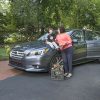Q&A: An Oncology Nurse and Healthcare Hero Shares Her Secrets for Success
We all know the importance of a glowing first impression. It’s the building block for business deals, budding relationships and establishing promising expectations. Now, imagine how essential a first impression and a warm welcome is when receiving cancer treatment. Oncology clinic nurse Maryann King-Hasbrouck makes it a priority to treat each of her patients like family. So in order to ensure she never experiences trouble getting to work each day at Philadelphia’s Cancer Treatment Center of America, she entrusts her Subaru Forester. That way, she can think more about providing first-class care and less about her lengthy commute.
Here, healthcare hero King-Hasbrouck shares her everyday work triumphs, personal passions (like animal welfare!), and how her Subaru makes both of those things easier.
Explain your day-to-day work and how long you’ve been working at CTCA.
Currently, I work on the intake team. We’re the first person that they meet [at CTCA]. We interview the patient, assess the patient and get information needed for the medical record. And then, we are trying to make the patient feel welcome. As intake nurses, we want them to feel welcome and we get them breakfast if they’re hungry. We’re like the first impression that the patients see here at CTCA and we want to make patients feel cared for and comfortable when they’re here.
How did you get your start in healthcare? Were you always in oncology?
I started working in healthcare when I first graduated from nursing school more than 25 years ago at another hospital in Philadelphia in the CCU. For a good portion of my career, I was an ICU nurse at various hospitals. And then when CTCA opened, I came here and I was one of the first nurses that opened the ICU here. I worked in the ICU for quite a while and then later I transferred to the outpatient clinic and I’ve been moving around a little since I’ve been here.
What’s the most exciting change you’ve noticed during your career in the medical field?
Recently, overall in healthcare, I think that the acceptance in the medical community is that nurse practitioners can deliver a lot more medical care to patients in a variety of fields—like family medicine or oncology. And it’s relatively news and it’s a monumental advancement for patients as well as for the medical profession. It brings the nursing dimension to healthcare. They’re embracing having more nurse practitioners and having nurses with advanced degrees. We have a lot of that here.
What’s the most challenging part of your job and how do you manage it?
It’s not necessarily different places or different types of jobs. It’s processing the grief experience and caring for patients that are getting cancer treatment. We’re also affected by that sometimes because we grow attached to our patients and if they’re not doing well, it’s extremely hard and painful to deal with that on an everyday basis.
Tell me about your team and how they provide comprehensive care for their patients.
We always work as a team and I go back in between different teams. Right now, I’m working a lot with the intake team and we meet with the new patients on their first days and we make sure their records get complete and then the physicians come in the morning and have a meeting with the oncologist about the patients with the whole team to discuss the patients: naturopathic medicine, dietary, everyone is included in the care of the patient and the plan that will work for that patient. Our team all comes together for those patients.
Fill in the blank: _______is the next big thing in healthcare.
For us in oncology, genomics is the next big thing coming up in healthcare. It enables us to individualize a treatment plan specific for each person’s different type of cancer and is really a new and growing field. We do genetic testing and genomics at CTCA which is something rather recent that we’ve started here.
How has your Subaru made your life easier?
I use it for my commute every day. It’s very reliable. We need our nurses to be here every day. And if it snows, my Subaru gets me here anyway. Sometimes I’m one of the few that gets here in a blizzard.
[I also use it] for one of the most important things to me besides my work, volunteering with the animal rescue. I really need a vehicle that I can rely on to do that. I go to animal rescues during disasters and I went after Hurricane Katrina. You really need to have a reliable vehicle and one that can accommodate all you need to do with it.
I drove to Monroe, Louisiana in the beginning. I was in the shelter for 21 days and I drove back home [in my Subaru], and I got redeployed and they flew me back for a couple of weeks. It was really great; the 1999 Subaru did really well. We have to deliver supplies, pet food, the animals themselves to shelters or the vets. It’s great for that; they have lots of space.
What model Subaru do you drive?
My model of Subaru—I’ve had several—is a 2004 Subaru Forester. It has 270,000 miles on it and it’s running great and gets me to work every day. Prior to that, I had a 1999 Subaru Forester. There was really nothing wrong with it, I just got the newer one several years ago; I bought it used. Subaru [vehicles] last a long, long time.
For more information about finding the right ride for you, visit Subaru, here.
This is a paid partnership between Subaru and Philadelphia Magazine



